FP249 – The Tightened Braid: a Blackhall Tale, Part 1 of 6
Welcome to Flash Pulp, episode two hundred and forty-nine.
(Part 1 – Part 2 – Part 3 – Part 4 – Part 5 – Part 6)
![]() Tonight we present, The Tightened Braid: a Blackhall Tale, Part 1 of 6.
Tonight we present, The Tightened Braid: a Blackhall Tale, Part 1 of 6.
[audio:http://traffic.libsyn.com/skinner/FlashPulp249.mp3]Download MP3
(RSS / iTunes)
This week’s episodes are brought to you by the Bear Crawling odcast.
Flash Pulp is an experiment in broadcasting fresh pulp stories in the modern age – three to ten minutes of fiction brought to you Monday, Wednesday and Friday evenings.
Tonight, Thomas Blackhall, master frontiersman and student of the occult, finds his recent return an unwelcome one.
The Tightened Braid: a Blackhall Tale, Part 1 of 6 – The Mute and the Mask
Written by J.R.D. Skinner
Art and Narration by Opopanax
and Audio produced by Jessica May
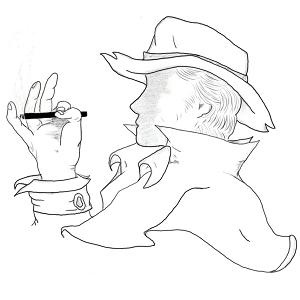 Thomas Blackhall, with his pants still muddied from travel, was leaning against the splinter-bristled door that acted as barrier between his rented room and the remainder of the Bucking Pony.
Thomas Blackhall, with his pants still muddied from travel, was leaning against the splinter-bristled door that acted as barrier between his rented room and the remainder of the Bucking Pony.
He was frowning.
Every item of worth which Thomas owned, but was not carrying, had been stolen, and the inconsequentials had been tossed about like decorative streamers.
Sitting upon the edge of the chamber’s disheveled bed was Wesley Shea, a fingerless man who had, some years earlier, suffered greatly under the cold’s abuse. More recently, he’d accompanied Thomas on a less-than-social visit through the tall pines.
He did not smile so often as he had at the expedition’s outset, but he had earned Blackhall’s trust in the undertaking.
The pair were eying a third: The silent lad who had, for the length of their excursion, driven the sleigh.
The youth was now resting on a meager stool, and wiping at his bloodied lip.
“Let me tell you a story,” said Thomas, “that I learned on my father’s knee, though it was old when he was on his Pa’s own.”
As he spoke, Blackhall moved steadily through the motions which would result in the production of a hand-rolled cigarette, stuffed with fine Virginia tobacco.
“There was a time, in the ancient lands, when a queen by the name of Shaina came to rule in place of her man, who had taken to the sea in an effort to drive back their enemies. Even as the winds carried the king away from her, however, a plot was born, by a betrayal-minded cabal of her own people, to slay the lady and have her throne usurped before the navy might return.
“Months later, despite a lack of official proclamation, rumours crept about dining tables and evening fires that Shaina had disappeared. As usual, no comment came from the court, but a journey to the country, to restore her health, was often offered as excuse for the lack of royal tidings.
“It was under these odd circumstances that a lone female rider arrived at the hamlet of Woodend, as the cocks still crowed. Her cloak was finely woven, although those of the village had little experience with which to judge any garments produced within a city’s limits, and, as her pony pranced along the muck lane that made up the town’s central road, the blacksmith – always amongst the first to awaken – moved quickly to stoke his fires and draw attention to his industry. The clang of his anvil, woke the seamstress, who, gazing down from the apartment above her shop, was quick to hobble downstairs to shuffle greater fineries onto display. The commotion was enough to rattle the proprietor of the public house, who, impressed by the early excitement, prodded her prize crooner from his beery doze to sing in the dawn.
“It wasn’t the breed of the stranger’s mount, nor her noble bearing, which had caught their attention – it was the silver mask which concealed her face.
“Soon Woodend was awash in the whispered news.
“The lone source of disinterest lay in the mute who’d come to live a simple life on the local church’s charity. Pleased to see the troubadour awake so unusually early, she was content to sit in the publican’s great room and listen to the full-throated melody.
“The keeper was happy to have the seat filled, as its occupant was known to offer assistance, unasked, throughout the village, and had come to be depended upon for quick support.
“As the day wore on, however, the soundless observer found the ebb and flow of patrons gave her a great vantage point in surveying the passage of the newcomer.
“By lunch there was talk of the trade at the blacksmith’s: That the outsider had avoided all questions as to her origin, and instead wished only to speak of business, in the most hushed of tones. Vague inquiries were made regarding large orders, even if no specifics were given. It became the consensus, amongst those gathered, that the stranger was of noble birth, and wearing the mask to maintain the secrecy of her identity. The blacksmith was all too happy to shoe the pony at no cost, in the hopes of future congress.
“By supper there was chatter from the seamstress’: That the visitor had asked after the outfitter’s stock of material, and how many sewing hands she might have at her disposal. Somehow the creation of a banner was raised, though the interloper was quick to move beyond the topic. Between sips of ale, a suspicion was born that perhaps the queen herself had come to roost in Woodend – and what better place to hide from the political machinations of the court?
“Finally, as night fell, the woman arrived at the inn’s entrance: She no longer travelled alone, but, instead, was surrounded by a retinue made up of the sort prone to throwing in with causes, or to starting violence. Ale flowed, and the company swelled. By midnight no mention of payment had come from either side, but the publican was happy enough to make room for the revellers, so that they might find beds instead of ruining furniture with the weight of their newly kindled patriotic fervor.
“The masked guest said little in the hubbub, but seemed pleased to preside over the scene with minimal intrusion.
“On the following morning, as the mute rose from her pallet in the small chapel, she cast her gaze over a greater count of weapons than Woodend had ever previously held. Word had spread, and the town was awash in men eager to retake the throne for a woman they’d never glimpsed.
“Wandering into the public house, she encountered a hushed reverence.
“The silver-face was speaking to a hedge knight, who had taken to his knee before her.
“”Can your arm be depended upon?” she asked.
“”Yes!” came response.”
“Men and women wept in the corners of the room, moved at the display, and the whispers were no longer avoidable.
““You have guessed well. It is I, your queen,” the disguised woman finally announced, as she pushed back her cloak hood, and pulled off her mask.
“Her locks were tightly curled, and her face carefully made. No person could have hoped for greater regality in their liege.
“The crowd cheered, but the roar was cut short by the approach of the speechless figure.
“Since her arrival, some months earlier, all had cultivated soft feelings towards the mute and her meanderings, but it seemed an odd moment to stand forward; Odder still were the results which poured from her open mouth.
“She said, “I must forgive you for not distinguishing the face of your queen – truly, it is a failing I have depended upon most heavily in recent times – but you must forgive me my deception, for even the farmers of Woodend have heard the rumours of shadowed hands holding poisoned daggers.”
“”I can speak now, as I too have had a strange visit in the night; a pigeon with news. My guard captain rides a day behind, and this impostor – my cousin – comes to stir an army to save her from the gallows, after being routed as the conspiracy’s head.”
“”Do not stand with this false ruler. You have known me, and if my silence was necessary to maintain my secret, you still have surely learned my nature,” she finished.
“The woman’s tongue held many truths. While a monarch’s portrait rarely moves, trade must flow. Neither countenance was recognizable, but her accent was unmistakable, to the merchants of the road, as highborn, and, by contrast, her cousin’s now seemed apparent as hailing from the outer provinces. Better yet, they’d come to discern her benevolence, and the eagerness which she’d displayed in assisting all without asking recompense – and so the story goes that, though she’d been nothing but a case for charity until that morning, when her guard arrived, they met a docile captive, and a town in full celebration.”
Blackhall, having finished his tale, jabbed the last of his burning vice into a small bowl brimming with similarly abandoned remains.
In taking another survey of his chamber, Thomas sighed.
“Fitzhugh was quite clever in leading us to believe we’d picked a random lad of local vintage to act as guide,” he said, “but we were not but halfway through our journey when your habits unmasked you. A soldier, even one so young as yourself, finds it hard to shake the habits of the profession: the grooming, the gait, the footwear.”
“Instead of shirking your company, however, I chose to perhaps make you my ally, by allowing you to hear the realities behind the rumours you’ve no doubt absorbed regarding my occult pursuits. In a sense, I hope that by demonstrating my unvarnished voice, I have shown that there are allegiances greater than even those owed to Her Majesty’s Armed Forces.
“I apologize for Shea’s agitation, he should not have struck you – but, now that you have steadied yourself, you must choose: Will you aid me, or will you side with Fitzhugh, a man agreeable to burgling the rooms of a supposed friend so that he might obtain artifacts he knows could initiate catastrophe?” Blackhall kicked aside a heap of ransacked laundry as he edged toward the target of his interrogation. “Your Captain may have a command of men, but what good shall it be if he mistakenly opens a portal onto a plane of fleshless horrors?“
The quiet boy’s eyes flickered with memory, and, after a moment, his confession came in a flood.
(Part 1 – Part 2 – Part 3 – Part 4 – Part 5 – Part 6)
Flash Pulp is presented by http://skinner.fm, and is released under the Canadian Creative Commons Attribution-Noncommercial 2.5 License.
Freesound.org credits:
Text and audio commentaries can be sent to skinner@skinner.fm, or the voicemail line at (206) 338-2792 – but be aware that it may appear in the FlashCast.
– and thanks to you, for reading. If you enjoyed the story, tell your friends.
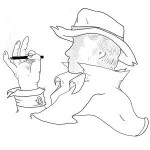 At the edge of a copse of spruce, Thomas Blackhall and Wesley Shea were hunkered beneath the weight of a shared bearskin. The watch had left the brown fur covered in a thick layer of snow, so that they seemed little more than a bump in the terrain, but Thomas knew too well that their scent alone was enough for the huntress.
At the edge of a copse of spruce, Thomas Blackhall and Wesley Shea were hunkered beneath the weight of a shared bearskin. The watch had left the brown fur covered in a thick layer of snow, so that they seemed little more than a bump in the terrain, but Thomas knew too well that their scent alone was enough for the huntress.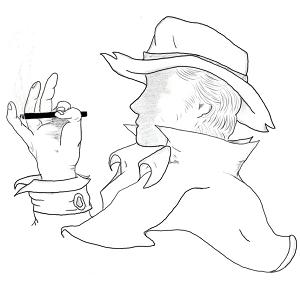 They’d hired a quiet driver from the edge of town, and the lad’s thick-furred mutt paced the sleigh as the trio slid beyond the settlements. As the sun crept through the sky, the trees grew close to the path, so that their their heavy branches sometimes left a snowy residue on the blanket which Wesley Shea was using as a refuge from the cold.
They’d hired a quiet driver from the edge of town, and the lad’s thick-furred mutt paced the sleigh as the trio slid beyond the settlements. As the sun crept through the sky, the trees grew close to the path, so that their their heavy branches sometimes left a snowy residue on the blanket which Wesley Shea was using as a refuge from the cold.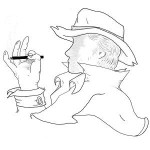 Thomas Blackhall had been working hard to avoid the puffy-faced private dogging his steps around the icicle-laden settlement of Perth. The frontiersman’s first tactic had been to simply leave with no indication as to his destination, and two-days hunting along a river sheltered by drooping pines had provided him with a formidable store of venison, but it was not enough to put off the messenger.
Thomas Blackhall had been working hard to avoid the puffy-faced private dogging his steps around the icicle-laden settlement of Perth. The frontiersman’s first tactic had been to simply leave with no indication as to his destination, and two-days hunting along a river sheltered by drooping pines had provided him with a formidable store of venison, but it was not enough to put off the messenger. “I need to freshen my cup,” said Thomas Blackhall, “and a stretch of my legs might change my fortune.”
“I need to freshen my cup,” said Thomas Blackhall, “and a stretch of my legs might change my fortune.” At the edge of White Creek, Miser Jenkins had taken up a hushed watch, with rod in hand. He’d spent the morning ignoring the fat flakes that drifted to the ground about him, as he knew that, despite the cold, the bass were just as in search of a meal as he.
At the edge of White Creek, Miser Jenkins had taken up a hushed watch, with rod in hand. He’d spent the morning ignoring the fat flakes that drifted to the ground about him, as he knew that, despite the cold, the bass were just as in search of a meal as he. Thomas had taken on two days rustic travel to answer the invitation, and he was somewhat vexed to discover the barefoot woman in ragged clothes muttering about the large house.
Thomas had taken on two days rustic travel to answer the invitation, and he was somewhat vexed to discover the barefoot woman in ragged clothes muttering about the large house. Standing, Blackhall moved to the last of the seats adjoining their squared table-top, and nodded his introduction to the group of strangers. With a wave to the barman, he indicated a further round of drink, while himself abstaining in light of his still half-full stein.
Standing, Blackhall moved to the last of the seats adjoining their squared table-top, and nodded his introduction to the group of strangers. With a wave to the barman, he indicated a further round of drink, while himself abstaining in light of his still half-full stein.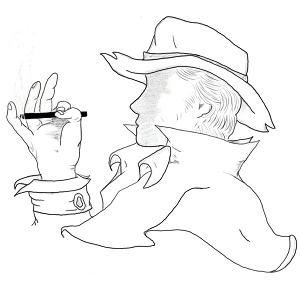 As the roar of the insects approached, Blackhall hoped his traveling companion, Sour Thistle, was sufficiently sheltered, and lofted high the silver chain which dangled from his moist palm. The denizens of the fen also understood the imminent threat, and their sudden hush only amplified the approaching drone.
As the roar of the insects approached, Blackhall hoped his traveling companion, Sour Thistle, was sufficiently sheltered, and lofted high the silver chain which dangled from his moist palm. The denizens of the fen also understood the imminent threat, and their sudden hush only amplified the approaching drone.